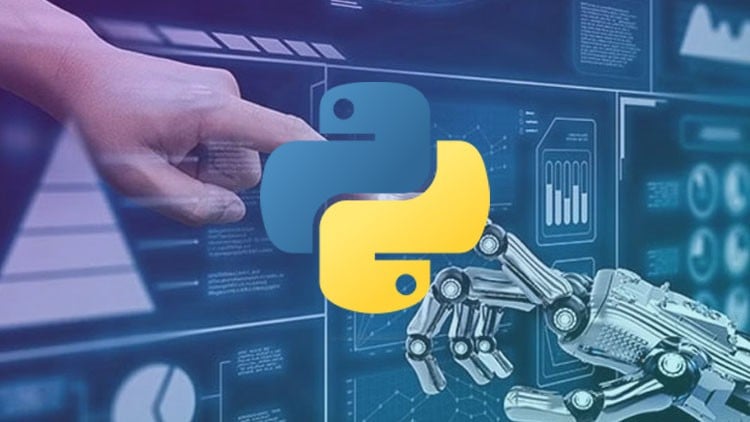
Gain a solid understanding of machine learning concepts, algorithms, and applications in various fields.
⏱️ Length: 2.0 total hours
⭐ 4.24/5 rating
👥 41,606 students
🔄 February 2024 update
Add-On Information:
Note➛ Make sure your 𝐔𝐝𝐞𝐦𝐲 cart has only this course you're going to enroll it now, Remove all other courses from the 𝐔𝐝𝐞𝐦𝐲 cart before Enrolling!
- Course Overview
This comprehensive ‘A to Z’ course serves as your gateway into the dynamic world of machine learning using Python. Designed for aspiring data scientists and developers, it meticulously guides you through the entire lifecycle of developing intelligent systems, from foundational concepts to practical implementation. You’ll embark on a journey that demystifies complex algorithms, transforming theoretical knowledge into actionable coding skills. The curriculum emphasizes a hands-on approach, ensuring that you not only understand ‘what’ machine learning is but also ‘how’ to apply it effectively to real-world datasets. We will explore the fundamental principles that underpin predictive modeling, enabling you to construct robust solutions for various analytical challenges. From understanding the nuances of preparing data for analysis to deploying and evaluating sophisticated models, this course provides a holistic perspective. It’s an essential starting point for anyone looking to build a strong base in artificial intelligence and leverage Python’s powerful libraries for data-driven insights. Prepare to unlock the potential of data and start your journey towards becoming proficient in machine learning. - Requirements / Prerequisites
- Basic Python Programming Skills: Familiarity with Python syntax, data structures (lists, dictionaries), and fundamental programming concepts (loops, functions).
- Enthusiasm for Learning: A genuine curiosity about how machines learn from data and a willingness to explore new computational paradigms.
- Access to a Computer: With an internet connection to access course materials and run Python development environments.
- No Prior Machine Learning Knowledge Required: This course is specifically designed to take you from beginner to a foundational understanding.
- Skills Covered / Tools Used
- Python Programming for Data Science: Master Python’s ecosystem for data manipulation and model building.
- Data Preprocessing & Feature Engineering: Techniques for cleaning, transforming, and preparing raw data for ML algorithms.
- Statistical Computing with NumPy: Utilize NumPy for efficient numerical operations and array manipulation.
- Data Analysis with Pandas: Gain proficiency in using Pandas for robust data structuring and aggregation.
- Data Visualization for Insights: Employ Matplotlib and Seaborn for exploratory data analysis and visualization.
- Fundamentals of Supervised Learning: Understand algorithms that learn from labeled data for classification and regression.
- Introduction to Unsupervised Learning: Explore methods that identify patterns and structures in unlabeled data.
- Model Training & Evaluation: Learn best practices for training ML models and assessing their performance.
- Developing ML Pipelines: Understand how to structure a complete ML workflow.
- Practical Scikit-learn Application: Implement various algorithms using Python’s versatile Scikit-learn library.
- Building Predictive Models: Construct, train, and validate models for accurate forecasts and classifications.
- Interpreting Model Results: Analyze and interpret ML model outputs to draw meaningful conclusions.
- Problem-Solving with ML: Apply learned concepts to solve real-world problems.
- Benefits / Outcomes
- Solid Foundational Understanding: Establish a robust understanding of core machine learning concepts and principles.
- Practical Python Proficiency: Become adept at using Python and its key libraries (NumPy, Pandas, Scikit-learn) for ML solutions.
- Ability to Build and Evaluate ML Models: Gain confidence to independently build, train, and critically evaluate various ML models.
- Enhanced Analytical Skills: Develop a systematic approach to analyzing data and formulating data-driven solutions.
- Pathway to Data Science Careers: Acquire essential knowledge and experience for roles in data science and machine learning.
- Informed Decision-Making: Learn to leverage machine learning insights for better decision-making in various contexts.
- Demystified ML Concepts: Break down the perceived complexity of machine learning, making it accessible to beginners.
- Preparation for Advanced Topics: Develop the necessary prerequisite knowledge for specialized areas like deep learning.
- Understanding of ML Lifecycle: Grasp the end-to-end process of a machine learning project.
- PROS
- Beginner-Friendly: Excellently structured for individuals new to machine learning.
- High Student Satisfaction: A 4.24/5 rating from over 41,000 students.
- Up-to-Date Content: Recently updated in February 2024 for relevance.
- Python-Centric: Focuses on Python, the industry standard for machine learning.
- Broad ‘A to Z’ Overview: Provides a wide scope of foundational topics.
- Practical Application: Emphasizes hands-on implementation over theory.
- CONS
- Requires Further Practice: While comprehensive for its length, mastering machine learning necessitates continuous self-practice and exploration beyond the course material.
Learning Tracks: English,Development,Programming Languages
Found It Free? Share It Fast!